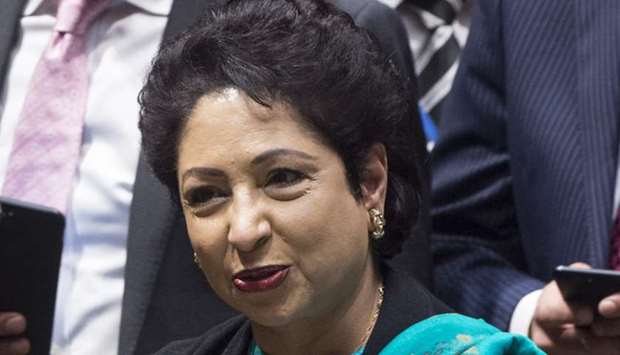The present government needs to review its performance: not necessarily in a public manner, but it has to see where course correction is needed.
This was said by Pakistan’s former ambassador to the United Nations Dr Maleeha Lodhi, while answering a question put to her by Dr Huma Baqai at a Zoom meeting organised by Lightstone Publishers Ltd on Friday evening.
Baqai started off the conversation by talking about the research that she had recently done on Lodhi, part of which was about the fact that she was one of the 100 women going to “influence the 21st century”.
Lodhi said that that was a reference to a Time magazine article in the 1990s and remarked that “you should not believe everything you read”.
This brought the host to Lodhi’s days as editor of The News, when she refused to take a half-page advertisement and ran a report instead.
Lodhi replied that she used to push back very hard as editor: “There’s always tension in every newspaper between the commercial and the editorial sides.”
At that time media mogul Mir Shakil-ur-Rehman said to her that “you keep challenging me”, and she responded: “I don’t have a choice, you’ve made me the editor, and I have to do my job.”
In today’s context the former ambassador said that “we’ve gone through ups and downs, and this is the freedom that the media has brought in Pakistan, it’s not given to the media”.
Lodhi explained that there have been phases in which media freedom has been under assault.
Even today there are unspoken restrictions on the media, which are different from the past [martial law period].
The media has played a key role in Pakistan’s democratisation; without it there would’ve been no democracy in Pakistan.
Answering a question on multilateralism, Lodhi first pointed out that one of her memorable moments in life was her meeting with Nelson Mandela in London.
During the conversation with him, he constantly kept talking about hope and stressed on idealism – that the young generation must be idealistic.
Lodhi then stated that multilateralism is facing a huge challenge, mostly coming from the United States; but it’s not just the US, other countries, too, are challenging it.
Multilateralism is in crisis, but “in a way it is like democracy, which is the worst form of governance except for everything else”.
She rejected the idea of a new Cold War with reference to the China-US tussle.
On the issue of Kashmir, Lodhi said that Pakistan has had a consistent policy on Kashmir [in the UN].
Every Pakistani government has done whatever it could to make sure the issue of Kashmir is kept alive and remained on the UN Security Council agenda.
When she was at the UN, she used every avenue to highlight the Kashmir issue.
Referring to the Justice Qazi Faez Isa reference, Lodhi said that the Supreme Court verdict on Friday made it a great day for the rule of law in Pakistan.
The reference against Isa was ill-conceived, she said. “This is the judge of the highest integrity. The Supreme Court has shown that it can give judgments independently.”
Lodhi also said that the present government needs to review its performance.
“It doesn’t have to do it publicly and see where course correction is needed. Nobody’s perfect. There’s always room to improve,” she said. “They are new, so the benefit of the doubt is with them.”
However, “there’s nothing more appealing to people than humility”.
She gave the example of New Zealand’s prime minister [Jacinda Ardern] who has successfully handled the coronavirus pandemic; the public complied with the lockdown because she showed humility, empathy and compassion.
On the Afghanistan situation, Lodhi said that the agreement between the US and the Taliban is about the US withdrawal [from the region] and the Taliban ensuring that they will not permit Afghan soil to be used as a staging ground for an attack against any other country.
Replying to the question about India winning a non-permanent seat on the UN Security Council, she said that both India and Pakistan have won elections.
Lodhi pointed out that this does have implications for the Kashmir issue, because a non-permanent member can do a lot of things behind the scenes.
Pakistan will have to be alert, and make sure it has enough friends in the council.
Commenting on the recent India-China border skirmish, she said this border region has always been a tense one.
However, she said, both countries want to step back from any wider conflict.
India under Modi has tried to follow a “muscular” policy and countries have pushed back against it.

Lodhi: There’s always room to improve.
